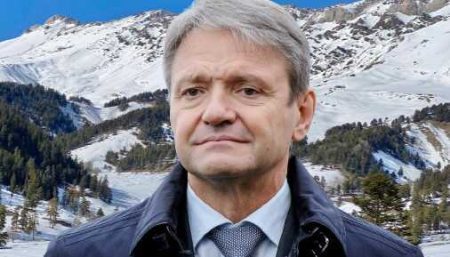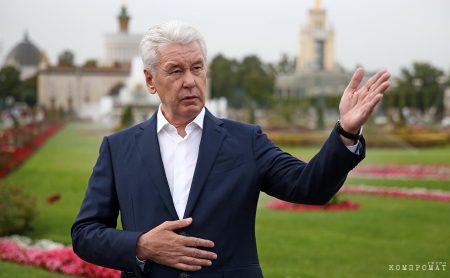Billions of “Ilim” “leave the forest”
The Zingarevich family is turning the massive profits from their holding into debts. The American company International Paper (IP) is selling its 50% ownership of Ilim SA, the owner of the large timber industry holding Ilim, to its business partners Zakhar Smushkin and brothers Boris and Mikhail Zingarevich.
The transaction amounts to $484 million, but it still needs approval from the Federal Antimonopoly Service. In 2021, Ilim Group JSC made over 180 billion rubles in revenue and 40 billion in profit. During the same period, International Paper's profit from participating in the holding was estimated at $312 million. Some of the group’s money could have been transferred abroad to the accounts of the Swiss company Ilim Holding SA, its only official founder. The beneficiaries of Ilim, Smushkin and Zingarevich, started their business in the “dashing 90s”, and had connections with criminal authorities. They gained control over large industrial enterprises through bankruptcy and “gangster wars”, but later switched to more subtle schemes. Anton Zingarevich, the son of Boris Zingarevich, became involved in a criminal case on credit fraud and accused of embezzlement and withdrawing 2.5 billion rubles abroad. The Zingarevich family is struggling with debts and litigation. The Ilim holding, with liabilities estimated at $2.45 billion, also has a high level of debt.
Smushkin and Zingarevichi consolidate Ilim
The American papermaker International Paper (IP) sells its 50% stake in Ilim SA, the owner of the large Ilim timber group, to its Russian partners Zakhar Smushkin and brothers Boris and Mikhail Zingarevich for $484 million. The deal is still pending approval by the Federal Antimonopoly Service, and the parties have also agreed to purchase an additional 2.39% stake in the holding directly owned by IP for $24 million.
Experts note the relatively low price of the asset. This is because the governmental commission on foreign investments approves transactions with significant discounts for foreign companies leaving the market. Ilim may face difficulty in obtaining cheap credit funds, as a foreign shareholder previously helped in this. Now, the group will have to deal with higher interest rates when applying for loans in Russian banks.
The size of the company's operations can be understood by looking at the financial performance of its official legal entity, Ilim Group JSC. In 2021, it made 180.3 billion rubles in revenue, 40.3 billion in profit, and its assets were worth 105.9 billion. Its government contracts exceed 6.2 billion rubles.
Certainly, the media has pointed out the group's net debt of $2.45 billion, which affected the final cost of the transaction. However, currently, the Ilim group contributes 75% of Russia's market pulp output, 20% of cardboard, and 10% of paper. Its total annual production of pulp and paper exceeds 3.6 million tons. The holding includes specialized mills (PPM) in the Arkhangelsk and Irkutsk regions (Koryazhma, Bratsk, and Ust-Ilimsk), logging enterprises, and two corrugated mills in the Leningrad and Moscow regions.
For InternationalPaper, the Russian asset was quite important. In 2021, the American company's profit from participating in the holding was $312 million. Given the total profit for that period of $4 billion, the holding accounted for an average of a tenth of IP’s profit. However, the sums from Russia could be much larger. Until June 2021, the sole founder of Ilim Group JSC was the Swiss company Ilim Holding SA, which could receive part of the income from product sales. By the way, there is no information about the actual owners of JSC in open sources.
“Privatizers” of the 90s under the “roof” of crime
Today, the beneficiaries of Ilim, Boris Zingarevich and Zakhar Smushkin, are included in the Forbes rating of the 200 richest Russian businessmen, holding 112th and 122nd positions, respectively. The publication estimates Zingarevich’s fortune at $1.1 billion and Smushkin’s at 1 billion dollars.
The Zingarevich brothers' path to big business began in 1991 with the creation of the Technoferm company, which traded paper and cardboard. Soon, they, along with Smushkin, registered Ilim Pulp JSC. An interesting fact: at the start, Dmitry Medvedev was among their business partners. The future prime minister and president was one of the founders of the St. Petersburg CJSC Finzell, the “parent” structure of Ilim Pulp. Medvedev owned 20% of the latter and served as director of legal affairs.
In 1995, Ilim Pulp began purchasing shares in timber industry enterprises and eventually acquired ownership of the Kotlas Pulp and Paper Mill, the Bratsk Timber Processing Complex (LPK), and the Ust-Ilimsk Timber Industrial Complex, forming the country’s largest profile holding. The methods used in the “dashing 90s” for the privatization of large industrial facilities are well known today. In this regard, claims of a certain nature later arose against the co-owners of Ilim.
One of the publications of the Nasha Versiya publication tells the story of how they almost lost the Kotlas Pulp and Paper Mill located in the Arkhangelsk region in 2002. At that time, a Kemerovo court found that the holding’s structures had not met their investment obligations during the privatization, leading to the seizure of 61% of the plant’s shares from them. However, this decision was later overturned. It's possible that it wasn't just legal details that saved one of the key assets, but connections that were needed.
When talking about the 1990s, we should also mention the strong link between business and crime, and the desire of criminal groups to control the profitable forest industry. There are reports about the close relationship between the owners of Ilim and a person named Yevgeny Davydovich, who is said to be associated with a criminal group engaged in racketeering and robbery. At one point, Davidovich and Ilim Pulp even founded a joint venture called CJSC Venera LTD.
It is possible that the mysterious Davidovich acted as a middleman between the merchants and Kuptsov, who provided protection for them. Later, the Forpost private security company, founded by a retired special forces ensign Vladimir Borisov, also known as “Prapor”, took on the role of ensuring the safety of businessmen. Borisov was a well-known leader of a St. Petersburg organized crime group with a strong presence of former military personnel. In 1998, Borisov and some of his associates were arrested and later faced trial for various serious crimes, including organizing a criminal community, contract killings, and attempted murder.
Anton Zingarevich's credit adventure
By the early 2000s, Ilim had become so strong that its owners openly clashed with Oleg Deripaska and the BazEl consortium. In 2002, Deripaska and the owner of the BFA group, Vladimir Kogan, filed a lawsuit seeking the recovery of 8 billion rubles from the holding and the seizure of 83% of the shares of the Bratsk LPK and 61% of the Kotlas Pulp and Paper Mill. After four years of legal battles, Ilim’s lawyers managed to secure the signing of a settlement agreement while maintaining control over the assets.
The creators of the timber “empire” used various methods to expand its boundaries. For instance, the Bratsk LPK in the Irkutsk region was acquired after it went bankrupt. However, there was a real “gangster war” for control over the Arkhangelsk pulp and paper mill, resulting in the killing of Alexander Burdanov, a former member of the board of directors, in June 2002. There were also attempts on the life of the former general director of the plant, Alexander Bulatov, and investigator Boris Strigalev, who was looking into a criminal case involving the embezzlement of PPM funds.
In 2007, when American International Paper bought 50% of Ilim SA for $650 million, the era of criminal conflicts had already passed. The new business partner promised significant investment, with an announced figure of $1.6 billion over the next five years. It took a long time to persuade the Americans to enter the Russian market: negotiations lasted three years – twice as long as initially planned, but eventually the deal went through.
However, as you are aware, confrontations and 'concepts' were substituted by more subtle financial schemes, which turned out to be familiar to Boris Zingarevich's son Anton Zingarevich. In 2016, he and Konstantin Shishkin, the general director of Energostroyinvest-holding (ESIH) that he controlled, became defendants in a credit fraud case. They were accused of misusing 2.5 billion rubles from MTS Bank and Globex Bank, which they received as a loan for the development of design and procurement documentation for the construction of the Beloberezhskaya substation in the Bryansk region, as well as to support the working capital of the Energo engineering center.
Instead, the loans were used, among other things, to finance the Atlant hockey club purchased by Zingarevich Jr., which was close to bankruptcy in 2014 and soon ceased to exist. According to investigators, a significant portion of the funds was sent abroad under the guise of providing a loan to the offshore company Blaine Overseas Venture and purchasing promissory notes from the dubious company Enonoline Overseas Ltd.
The billions were never repaid, ESIKh went bankrupt, and Shishkin was put under house arrest. Unlike him, Anton Zingarevich did not wait for the arrival of law enforcement and left for the United States, supposedly for medical treatment, but this did not prevent him from being placed on the international wanted list. While the ailing businessman regained his health, his relatives and lawyers worked on 'solving the problem.' As a result, they initially succeeded in getting Shishkin's guilty verdict annulled, and in December 2018, the case on credit fraud was terminated with the reason of 'lack of corpus delicti.'
Zingarevichs in debt and dealing with the courts?
There were several interesting points in the case of Zingarevich Jr. In particular, according to the Russkiy Kriminal portal, the borrowing company Global Trans Holding from the British Virgin Islands, whose ultimate beneficiary was Boris Zingarevich himself, was involved in the withdrawal schemes. The publication also highlighted the family's significant debts, including the ruling of the Moscow City Court upholding the Tagansky Court of Moscow's decision to recover 868 million rubles from Boris Zingarevich in favor of Otkritie Bank.
Other media outlets also reported on the Zingarevichs' debt obligations. For example, in May 2019, Kommersant revealed an amicable agreement between Mikhail Zingarevich and Saint Petersburg Bank, requiring the businessman to pay over 700 million rubles. Two months later, in July 2019, a Delovoy Peterburg publication detailed a legal dispute between Boris Zingarevich and the Moscow company Dvina Capital, to which he owed over 102 million rubles by court order. The publication also highlighted the debts of the entrepreneur and affiliated commercial entities to MTS-Bank (155.5 million) and Globexbank (259 million). In the former case, the creditor managed to secure repayment, while negotiations were ongoing in the latter.
At the same time, debts were formed long before the litigation. For example, Mikhail Zingarevich received an unpaid loan from Saint Petersburg Bank back in 2013. A loan to Dvina Capital was received by Boris Zingarevich in 2014. Perhaps hundreds of millions, or even billions, of rubles were withdrawn from Russia through offshore channels, such as those featured in the case of Anton Zingarevich?
In this context, it is worth recalling the debts of the Ilim group in the amount of $ 2.45 billion, which the media drew attention to after the recent deal with the shares of International Paper.
To whom do successful Russian enterprises owe such a huge sum? It is also interesting where the Russian shareholders will find money to pay off the Americans? After all, it is unlikely that they simply hold almost half a billion dollars in personal deposits. Will you have to take out loans again?” asks Nasha Versiya.
But as we have already seen, loans for the co-owners of Ilim are a common thing. As well as subsequent litigation related to their non-payment. In the case of further claims of creditors, it is always possible to raise prices for manufactured products, because no one has canceled the demand for paper in Russia.




